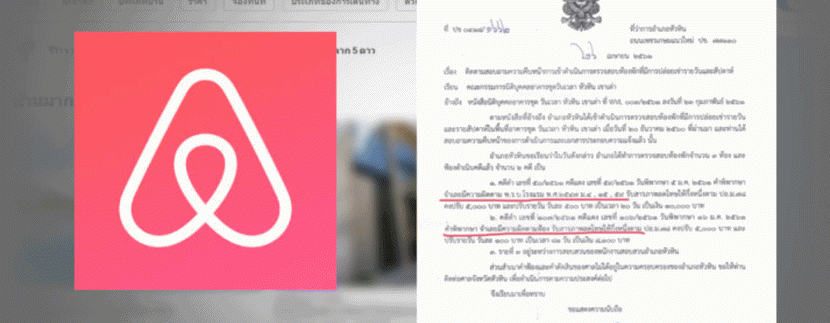Recent court ruling decides that Airbnb daily and weekly rentals are illegal.

In a recent article posted on Thai Visa, a local court in Hua Hin has made a landmark ruling declaring daily and weekly rentals as being both illegal and subject to a fine. The local authorities (plaintiff) lodged 3 separate cases against the Wan Vayla Condominium Complex in Khao Tao (defendant). In each of the 3 separate cases, the defendants alleged that the defendants were renting out condominiums to people for less than a month. In 2 of the 3 separate cases, the court has ruled that the defendants have contravened the basic regulations governing hotels and as such has fined the defendants, a 5,000THB fine for each case in addition to a pro-rata daily fine of between 100THB and 500THB for each day that the defendants contravened these hotel regulations. Whereas the court was careful to stress that any rental of 30 days or more was and still remains perfectly legal.
The practice of daily and weekly rentals contravenes the Hotel Act, as operators are required to have a valid hotel license. Furthermore, in certain respects this practice may be regarded as a commercial business, especially if the operator has 5 or more units and as a consequence may also violate the Condominium Act, which forbids commercial activities, and more especially if foreigners are involved the Foreign Business Act. To add insult to injury these operators rarely pay any personal income tax (if any) on any such rental income. And if this wasn’t reason enough as to why the court ruled in favor of the plaintiff, any daily or weekly operator also risks contravening the Immigration Act, should they fail to report the whereabouts of any foreigner(s) staying in their premises within 24 hours of the foreigner first moving into the said premises.
Given the sheer number of possible contraventions of the law, it’s hardly surprising to see that the court in my opinion has quite rightly ruled in favor of the plaintiff. Naturally the outcome of this case may have a huge knock on effect on companies such as AirBnB who have been widely criticized worldwide for this practice. For one it can be argued that AirBnB tenants don’t enjoy the same standards of safety which is expected from hotel operators which under sections 674 & 679 of the Thai Civil and Commercial Code are liable for any damages and losses suffered by its guests, even if such damages and/or losses are caused by strangers, whereas in the case of an individual tenant and condominium landlord, it’s still unclear as to whether or not the Thai Courts would apply the same sections. Finally, to add yet more insult to injury frequent complaints by condominium co-owners who quite rightly argue that frequent arrivals of AirBnB tenants has had an adverse effect on their quality of life and perhaps more importantly the overall knock on effect on the general economy and labor markets as hotel operators have undoubtedly been hard hit from the loss in business may be the final nail in the coffin for companies such as AirBnB. All of which leaves me in very little doubt that the powers that be will be increasingly clamping down on companies such as AirBnB and landlords who rent out their properties on a daily or weekly basis. This is precisely the reason as to why we at My Pattaya Condo actively discourage our clients from renting out their properties for anything less than 30 days. In fact, we’ve even gone one step further by focusing almost exclusively on 6 and 12 month rentals in the condominium leasing sector. We also assist tenants and landlords to draw up comprehensive lease agreements which are both fair and impartial to both parties, and if need be we can step in as an impartial arbitrator to sort out any issues which might arise during the course of any tenancy agreement.
So to sum up whether you’re a tenant or landlord it would most definitely be advantageous to contact our dedicated and professional team over at My Pattaya Condo.
